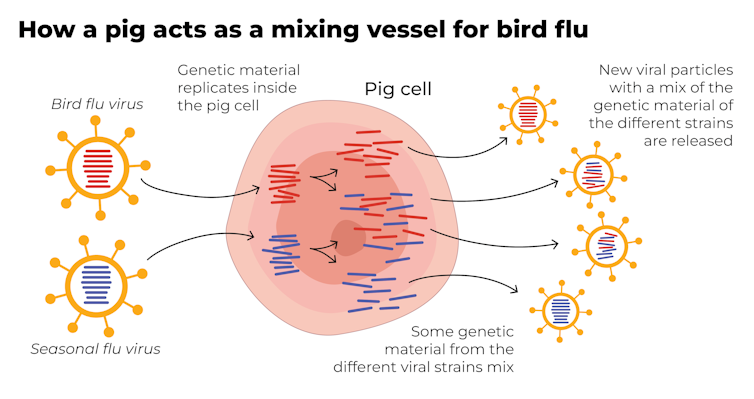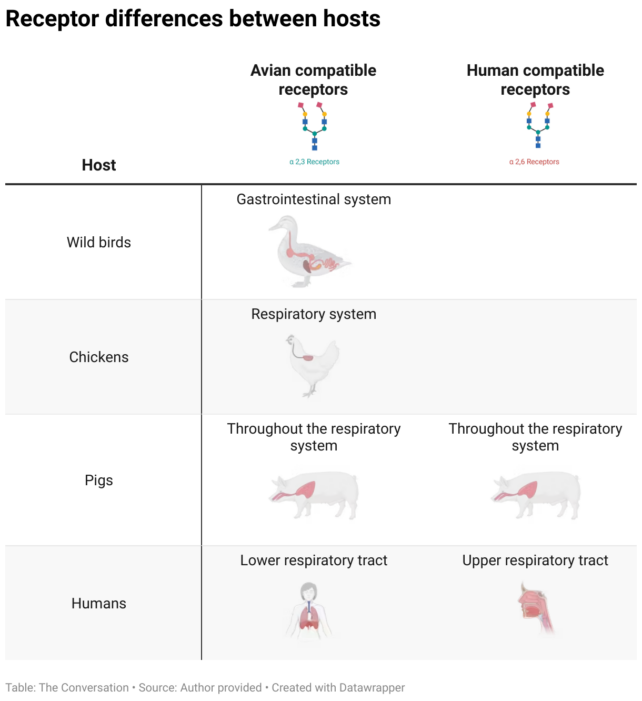America Division of Agriculture final week reported {that a} pig on a yard farm in Oregon was contaminated with fowl flu.
Because the fowl flu state of affairs has developed, we have heard concerning the A/H5N1 pressure of the virus infecting a spread of animals, together with a wide range of birds, wild animals and dairy cattle.
Luckily, we’ve not seen any sustained unfold between people at this stage. However the detection of the virus in a pig marks a worrying improvement within the trajectory of this virus.
How did we get right here?
Essentially the most regarding sort of fowl flu presently circulating is clade 2.3.4.4b of A/H5N1, a pressure of influenza A.
Since 2020, A/H5N1 2.3.4.4b has unfold to an unlimited vary of birds, wild animals and cattle which have by no means been contaminated with fowl flu earlier than.
Whereas Europe is a hotspot for A/H5N1, consideration is presently centered on the US. Dairy cattle have been contaminated for the primary time in 2024, with greater than 400 herds affected throughout at the very least 14 US states.
Chook flu has huge impacts on farming and industrial meals manufacturing, as a result of contaminated poultry flocks should be culled, and contaminated cows may end up in contaminated diary merchandise. That stated, pasteurisation ought to make milk secure to drink.
Whereas farmers have suffered main losses resulting from H5N1 fowl flu, it additionally has the potential to mutate to trigger a human pandemic.
Birds and people have various kinds of receptors of their respiratory tract that flu viruses connect to, like a lock (receptors) and key (virus). The attachment of the virus permits it to invade a cell and the physique and trigger sickness. Avian flu viruses are tailored to birds, and unfold simply amongst birds, however not in people.
Up to now, human instances have primarily occurred in individuals who have been in shut contact with contaminated cattle or birds. Within the US, most have been farm staff.
The priority is that the virus will mutate and adapt to people. One of many key steps for this to occur could be a shift within the virus’ affinity from the fowl receptors to these discovered within the human respiratory tract. In different phrases, if the virus’ “key” mutated to raised match with the human “lock”.
A latest research of a pattern of A/H5N1 2.3.4.4b from an contaminated human had worrying findings, figuring out mutations within the virus with the potential to extend transmission between human hosts.
Why are pigs an issue?
A human pandemic pressure of influenza can come up in a number of methods. One entails shut contact between people and animals contaminated with their very own particular flu viruses, creating alternatives for genetic mixing between avian and human viruses.
Pigs are the best genetic mixing vessel to generate a human pandemic influenza pressure, as a result of they’ve receptors of their respiratory tracts which each avian and human flu viruses can bind to.
This implies pigs will be contaminated with a fowl flu virus and a human flu virus on the identical time. These viruses can trade genetic materials to mutate and change into simply transmissible in people.

(The Dialog, CC BY-SA)
Curiously, prior to now pigs have been much less vulnerable to A/H5N1 viruses. Nonetheless, the virus has just lately mutated to infect pigs extra readily.
Within the latest case in Oregon, A/H5N1 was detected in a pig on a non-commercial farm after an outbreak occurred among the many poultry housed on the identical farm. This pressure of A/H5N1 was from wild birds, not the one that’s widespread in US dairy cows.
The an infection of a pig is a warning. If the virus enters industrial piggeries, it might create a far better degree of danger of a pandemic, particularly because the US goes into winter, when human seasonal flu begins to rise.

How can we mitigate the chance?
Surveillance is vital to early detection of a attainable pandemic. This contains complete testing and reporting of infections in birds and animals, alongside monetary compensation and help measures for farmers to encourage well timed reporting.
Strengthening international influenza surveillance is essential, as uncommon spikes in pneumonia and extreme respiratory diseases may sign a human pandemic. Our EPIWATCH system seems for early warnings of such exercise, which may velocity up vaccine improvement.
If a cluster of human instances happens, and influenza A is detected, additional testing (known as subtyping) is important to determine whether or not it is a seasonal pressure, an avian pressure from a spillover occasion, or a novel pandemic pressure.
Early identification can forestall a pandemic. Any delay in figuring out an rising pandemic pressure allows the virus to unfold broadly throughout worldwide borders.
Australia’s first human case of A/H5N1 occurred in a toddler who acquired the an infection whereas travelling in India, and was hospitalised with sickness in March 2024. On the time, testing revealed Influenza A (which might be seasonal flu or avian flu), however subtyping to determine A/H5N1 was delayed.
This sort of delay will be pricey if a human-transmissible A/H5N1 arises and is assumed to be seasonal flu as a result of the check is constructive for influenza A. Solely about 5% of assessments constructive for influenza A are subtyped additional in Australia and most nations.
In gentle of the present state of affairs, there must be a low threshold for subtyping influenza A strains in people. Fast assessments which may distinguish between seasonal and H5 influenza A are rising, and will type a part of governments’ pandemic preparedness.
A better danger than ever earlier than
The US Facilities for Illness Management and Prevention states that the present danger posed by H5N1 to most of the people stays low.
However with H5N1 now capable of infect pigs, and exhibiting worrying mutations for human adaptation, the extent of danger has elevated. Given the virus is so widespread in animals and birds, the statistical chance of a pandemic arising is increased than ever earlier than.
The excellent news is, we’re higher ready for an influenza pandemic than different pandemics, as a result of vaccines will be made in the identical approach as seasonal flu vaccines. As quickly because the genome of a pandemic influenza virus is understood, the vaccines will be up to date to match it.
Partially matched vaccines are already out there, and a few nations resembling Finland are vaccinating high-risk farm staff.![]()
C Raina MacIntyre, Professor of World Biosecurity, NHMRC L3 Analysis Fellow, Head, Biosecurity Program, Kirby Institute, UNSW Sydney and Haley Stone, Analysis Affiliate, Biosecurity Program, Kirby Institute & CRUISE lab, Pc Science and Engineering, UNSW Sydney
This text is republished from The Dialog underneath a Inventive Commons license. Learn the unique article.

